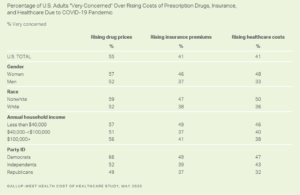
Fears abound of COVID-19 crisis worsening affordability challenges of U.S. healthcare system.
WASHINGTON, D.C. and SAN DIEGO, CA — June 18, 2020 — Nearly 9 in 10 U.S. adults are “very” (55%) or “somewhat” (33%) concerned that the pharmaceutical industry will leverage the COVID-19 pandemic to raise drug prices. Similarly, 84% are very or somewhat concerned that the general cost of care will rise, and 79% are very or somewhat concerned their health insurance premiums will go up in response to the pandemic. In each of the latter two scenarios, 41% of Americans are very concerned.
The new findings, released today by the nonprofit West Health and Gallup as part of ongoing research on the rising cost of healthcare in the U.S., come from a nationally representative survey of 1,016 U.S. adults. Amid a mounting death toll, the results underline the knife-edge fears associated with paying for care in the U.S.
Fears related to the cost impacts of the COVID-19 pandemic vary by demographic subgroup. Most Americans, regardless of gender, race, income or political identity, believe drug prices will rise. However, there is less consensus regarding rising insurance premiums and healthcare costs.
Among key demographic differences:
- Fifty-seven percent of women are very concerned about rising drug prices, compared with 52% of men.
- Nearly half of women (48%) are very concerned about the general cost of care rising, compared with 33% of men.
- Fifty percent of nonwhites are very concerned about the general cost of care rising, compared with 36% of whites.
- Forty-six percent of women are very concerned about rising insurance premiums, compared with 37% of men.
- Forty-seven percent of nonwhites are very concerned about rising insurance premiums, compared
with 38% of whites. - Forty-nine percent of households making less than $40,000 a year are very concerned about rising insurance premiums, compared with 37% of those making between $40,000 and $100,000. However, those making more than $100,000 a year express greater concern (41%).
- Democrats (66%) are more likely to say they are very concerned about rising drug prices than are independents (52%) or Republicans (49%).

“Concerns loom large that when the pandemic is all over, Big Pharma and insurance companies will revert to old patterns and behaviors and continue to squeeze Americans with ever-higher drug prices and insurance premiums,” said Tim Lash, chief strategy officer for West Health. “If history is any guide, these concerns are well-founded, which is why promises to rein in prices are not enough. We need to retool our healthcare system and enact smart legislation now.”
Amid concerns about how the COVID-19 pandemic could raise healthcare costs, a large majority of Americans support the federal government directly negotiating the price of a treatment for the disease with the drug manufacturer. Eighty-eight percent of U.S. adults support this intervention, with very little daylight between Democrats (91%), independents (87%) and Republicans (89%).
Perceptions of the U.S. Response to COVID-19
As countries, including the U.S., continue to grapple with the effects of the pandemic and look ahead to a potential second wave of infections, Americans hold dim views of how their country has responded so far. Relative to how much the U.S. spends on healthcare, 9% of respondents rate the U.S. response as “excellent” and another 14% as “very good.” In contrast, 34% rate the response as “poor” and 23% as “fair.”
These perceptions are inversely related to both education and income. For example, among those with postgraduate degrees, 72% evaluate the response as fair or poor, compared with 49% of those whose education was high school or less. Political identity also greatly informs perspectives, with 84% of Democrats evaluating the response as fair or poor, compared to 28% of Republicans.
“Americans are clearly worried about the impact of the coronavirus pandemic well beyond being exposed to or spreading the disease,” said Dan Witters, Gallup senior researcher. “Still, their misgivings regarding pharmaceutical companies and general anxieties regarding the cost of care are tempered by a clear, bipartisan call to policymakers to get involved to ensure that the public will be able to afford a treatment for COVID-19.”
The new findings come from a nationally representative survey of 1,016 U.S. adults conducted between May 11 and May 22, 2020. Respondents represent all 50 U.S. states and the District of Columbia.
Full results, including a complete methodology statement, can be found at the link below:
https://news.gallup.com/poll/312641/nine-concerned-rising-drug-costs-due-covid.aspx
About Gallup
Gallup delivers analytics and advice to help leaders and organizations solve their most pressing problems. Combining more than 80 years of experience with its global reach, Gallup knows more about the attitudes and behaviors of employees, customers, students and citizens than any other organization in the world.
About West Health
Solely funded by philanthropists Gary and Mary West, West Health is a family of nonprofit and nonpartisan organizations including the Gary and Mary West Foundation and Gary and Mary West Health Institute in San Diego, and the Gary and Mary West Health Policy Center in Washington, D.C. West Health is dedicated to lowering healthcare costs to enable seniors to successfully age in place with access to high-quality, affordable health and support services that preserve and protect their dignity, quality of life and independence. Learn more at westhealth.org and follow @westhealth.
###
MEDIA CONTACT:
Riley Brands
Strategic Communications Lead
Gallup
Riley_brands@gallup.com
202-715-3106
Zach Gross
For West Health
zach@compartnersny.com
212-266-0063
